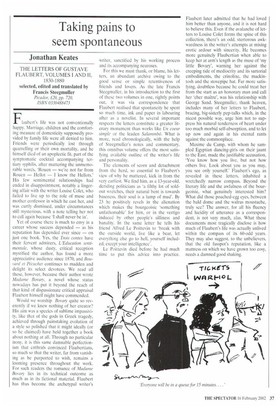Taking pains to seem spontaneous
Jonathan Keates
THE LETTERS OF GUSTAVE FLAUBERT, VOLUMES I AND II, 1830-1880 selected, edited and translated by Francis Steegmuller Picador, £20, pp. 720, ISBN 0330488473 Flaubert's life was not conventionally happy. Marriage, children and the comforting measure of domesticity supposedly provided by family life were all denied to him. Friends were periodically lost through quarrelling or their own mortality, and he himself died of an apoplectic fit, part of the symptomatic cocktail accompanying tertiary syphilis, after muttering the unmemorable words, 'Rouen — we're not far from Rouen — Hellot — I know the Hellots.' His few sentimental relationships had ended in disappointment, notably a lingering affair with the writer Louise Colet, who failed to live up to the role of muse and mother confessor in which he cast her, and was curtly dismissed, under circumstances still mysterious, with a note telling her not to call again because 'I shall never be in'.
Yet of course there is much to envy in a career whose success depended — as his reputation has depended ever since — on just one book. Yes, the Trois contes have their fervent admirers, L'Educadon sentimentale, whose dusty, critical reception mystified the author, has found a more appreciative audience since 1870, and Bouyard et Pecuchet continues to madden and delight its select devotees. We read all these, however, because their author wrote Madame Bovary, a novel whose status nowadays has put it beyond the reach of that kind of dispassionate critical appraisal Flaubert himself might have commended.
Would we worship Boyar), quite so re‘erently if we knew nothing of her creator? His aim was a species of sublime impassivity, like that of the gods in Greek tragedy, achieved through painstaking evolution of a style so polished that it might ideally (or so he claimed) have held together a book about nothing at all. Through no particular irony, it is this same damnable perfectionism that enthrals convinced Flaubertians, so much so that the writer, far from vanishing as he purported to wish, remains a looming presence throughout the work. For such readers the romance of Madame Bovary lies in its technical outcome as much as in its fictional material. Flaubert has thus become the archetypal writer's
writer, sanctified by his working process and its accompanying neuroses.
For this we must thank, or blame, his letters, an abundant archive owing to the good sense or simple retentiveness of friends and lovers. As the late Francis Steegmuller, in his introduction to the first of these two volumes in one, rightly points out, it was via correspondence that Flaubert realised that spontaneity he spent so much time, ink and paper in labouring after as a novelist. In several important respects the letters constitute a greater literary monument than works like Un coeur simple or the leaden Salammbo. What is more, read chronologically, with the help of Steegmuller's notes and commentary, this omnibus volume offers the most satisfying available outline of the writer's life and personality.
The elements of scorn and detachment from the herd, so essential to Flaubert's view of why he mattered, kick in from the very earliest, We find him, as a 13-year-old, deriding politicians as 'a filthy lot of soldout wretches, their natural bent is towards baseness, their soul is a lump of mud'. By 23 he positively revels in the alienation which makes the bourgeoisie 'something unfathomable' for him, or in the vertigo induced by other people's silliness and banality. In the same letter he tells his friend Alfred Le Poittevin to 'break with the outside world, live like a bear, let everything else go to hell, yourself included, except your intelligence'.
Le Poittevin died before he had much time to put this advice into practice. Flaubert later admitted that he had loved him better than anyone, and it is not hard to believe this. Even if the avalanche of letters to Louise Colet forms the spine of this collection, there's an odd, stertorous awkwardness in the writer's attempts at mixing erotic ardour with sincerity. He becomes more genuinely Flaubertian when able to keep her at arm's length as the muse of 'my little Bovary', warning her against the creeping tide of mediocrity and its sartorial embodiments, the crinoline, the mackintosh and the stovepipe hat. Far more satisfying, doubtless because he could treat her from the start as an honorary man and call her 'cher maitre', was his relationship with George Sand. Steegmuller, thank heaven, includes many of her letters to Flaubert, bracing, big-sisterly pep-talks which, in the nicest possible way, urge him not to suppress his natural tenderness of heart under too much morbid self-absorption, and to let up now and again in his eternal rants against the commonplace.
Maxime du Camp, with whom he sampled Egyptian dancing-girls on their jaunt to the East, made the justifiable accusation, 'You know how you live, but not how others live. Look about you as you may, you see only yourself.' Flaubert's ego, as revealed in these letters, inhabited a wretchedly narrow compass. Beyond the literary life and the awfulness of the bourgeoisie, what genuinely interested him? What did those poached-egg eyes, between the bald dome and the walrus moustache, truly see? The answer, for all his fluency and lucidity of utterance as a correspondent, is not very much, alas. What these documents most tragically disclose is how much of Flaubert's life was actually unlived within the compass of its 60-odd years. They may also suggest, to the unbelievers, that the old fusspot's reputation, like a mattress on which we have grown too cosy, needs a damned good shaking.




































































 Previous page
Previous page